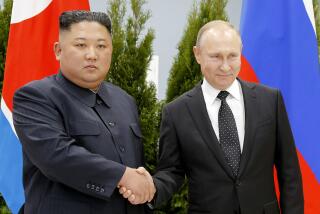Experts Call for N. Korea Dialogue
- Share via
WASHINGTON — The Bush administration should immediately hold bilateral talks with North Korea -- even though such talks may fail to dissuade the communist regime from making nuclear weapons -- because the alternatives are worse and time is running out, experts told a Senate committee Thursday.
Three floors below the room where the experts were testifying, Secretary of State Colin L. Powell complained to a different Senate panel that every time he picks up the morning newspaper it suggests that a quick solution is at hand if only he would “just call [the North Koreans] up and go talk to them.”
Powell gave senators his much-repeated argument that bilateral talks with North Korea had failed in the past and would probably fail now. He reassured them that “we have a number of diplomatic initiatives underway, some of them very, very quietly underway, to see if we cannot get a multilateral dialogue started. And we are looking for a peaceful solution to this problem, and we are committed to a nonnuclear Korean peninsula.”
The dueling testimonies were symptomatic of an emerging political problem for President Bush: On the eve of a possible war with Iraq, he is under fierce attack at home for a North Korea policy that has failed to persuade Pyongyang to change course.
The Bush administration, critics charge, is “paralyzed” by infighting at a critical moment.
A leading critic, Sen. Joseph R. Biden Jr. (D.-Del.), said a “San Andreas fault” divides officials who seek the ouster of North Korean President Kim Jong Il from those who have reluctantly concluded that the U.S. must at least try to strike a deal with the dictator -- but that it must be more sweeping and more verifiable than the one reached under the Clinton administration.
During his news conference Thursday, Bush said that a multilateral approach is important because the issue of North Korea’s nuclear weapons program has ramifications not just for the U.S., but for South Korea, Japan, Russia and China, and that all should share the responsibility for convincing Kim that making nuclear weapons is not in his nation’s best interest.
Over the past two days, many security experts in the United States have laid out for the Senate frightening scenarios of what might happen if North Korea begins to reprocess plutonium at its plant in Yongbyon, where the U.S. said there has recently been heightened activity.
The administration could try to isolate a nuclear North Korea and await its collapse. But the experts agreed that no U.S. “containment” strategy could prevent the nation from smuggling out a lump of plutonium the size of a baseball for sale to the highest bidder.
Moreover, even if Kim decided not to export spare plutonium, his regime could collapse and his “loose nukes could fall into the hands of warlords or factions,” warned Ashton B. Carter, a former assistant defense secretary now at Harvard University.
“The half-life of plutonium-239 is 24,400 years,” Carter told the Senate Foreign Relations Committee on Thursday. “I don’t know how long the North Korean regime will last, but it’s not that long.”
Other options for the administration would be a preemptive military strike on the Yongbyon plant, accepting the risk that Kim might retaliate on Seoul, the experts said.
However, the U.S. would be in a far stronger position to carry out such a strike, and it could expect international support for military action only if it had exhausted the option for diplomacy, Carter said.
Robert J. Einhorn, who negotiated with the North Koreans during the Clinton administration, and Arnold Kanter, a White House and State Department official under presidents Reagan and Bush, agreed with Carter.
All three experts proposed variations on a deal in which the U.S. would promise not to attack North Korea while talks were underway, or impose sanctions. In return, North Korea would pledge to freeze its nuclear programs, allow international inspectors back into Yongbyon and not export any ballistic missiles during talks.
More to Read
Get the L.A. Times Politics newsletter
Deeply reported insights into legislation, politics and policy from Sacramento, Washington and beyond. In your inbox twice per week.
You may occasionally receive promotional content from the Los Angeles Times.










